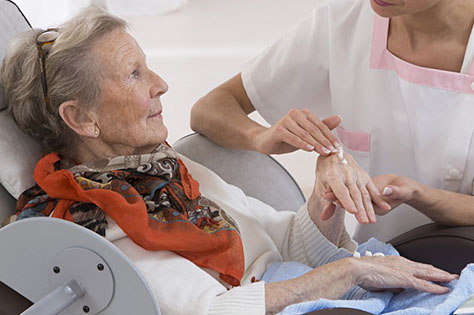SEATING RESIDENTS WITH DEMENTIA IN RESIDENTIAL AGED CARE FACILITIES
By Taree Gibson – Physiotherapist/ Clinical Educator Agestrong Physio
WE ALL LOOK FORWARD TO COMING HOME TO OUR LOUNGE ROOM CHAIR IN THE EVENING TO WATCH OUR FAVOURITE TELEVISION SHOW OR ENJOY THE COMPANY OF LOVED ONES.
Think about how important it is to you to be comfortable and well supported in your chair, but still have the freedom and ability to move around, reposition yourself and interact with your environment.
Whilst staff, family and residents all acknowledge adequate seating as important within residential aged care, formal postural assessment, sitting balance and seating requirement assessments do not routinely formally occur for the resident with dementia in aged care facilities.
As a result, these residents often fall victim to inadequate seating.
Poor posture as a result of inadequate seating practices has been linked to:
- Pain
- Pressure issues with skin integrity
- Social isolation
- Fatigue
- Contractures
- Gastrointestinal and cardiovascular dysfunction
Appropriate seating for the resident with dementia promotes:
- Comfort and relaxation, reducing agitation
- Support and stability positively impacting on functional ability
- Maintenance of optimal musculoskeletal condition
- Improved quality of life through participation enhancement
- Improved nutrition intake and reduced aspiration risk
- Optimal respiratory health
- Reduction of risk on staff whilst transferring or providing care to residents
Employing adequate seating practices in your facility requires:
- A multidisciplinary, person centred approach
- Appropriate assessment tool implementation such as the Seating Identification Tool (SIT) which has been found reliable in identifying the need for seating intervention
- Care staff and family education in regards to equipment use, timing for repositioning and identifying moments when a resident with dementia is deteriorating due to inadequate seating practices
- Systems change to ensure assessment, audit and continuous improvements to the area of seating
- Specialist involvement from health professionals with knowledge and expertise in postural assessment and optimisation such as Physiotherapists and Occupational TherapistsAgestrong Physio can provide clinicians with postural seating experience to assist with assessment, audits, advice and access to seating care options within your facility.



